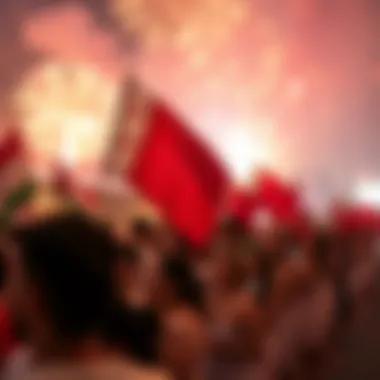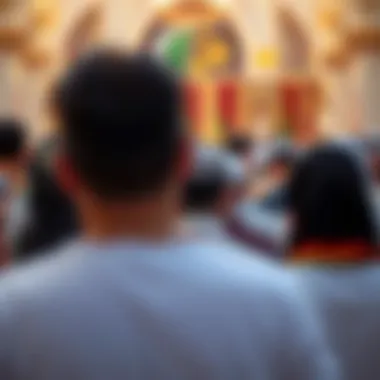UAE National Holidays 2023: Significance and Insights


Intro
The United Arab Emirates stands tall as a beacon of cultural richness and modernity. From its picturesque skyscrapers in Dubai to the serene deserts of Abu Dhabi, UAE is a melting pot of tradition and innovation. Central to its social fabric are the national holidays, celebrated fervently by both locals and expatriates. In 2023, these holidays not only offer a glimpse into the UAE's vibrant culture but also significantly influence the real estate market and economic landscape, particularly in Dubai.
This guide will take you through the key national holidays, their historical significance, and the communal festivities that accompany them. We'll delve into how these occasions affect various sectors, especially real estate. For investors and homebuyers, understanding the nuances of these holidays can provide valuable insight into market trends, investment opportunities, and overall social dynamics. The spotlight will be on celebrating the UAE's spirit while navigating the practical implications of these holidays.
There's much to explore, from significant dates to traditional practices. This guide ultimately aims to arm the savvy reader with essential knowledge that can further enrich one's experience in this dynamic region.
A Quick Overview of National Holidays in the UAE
In the UAE, national holidays encompass both Islamic and civil occasions, marking significant events in the nation’s history and growth. Each holiday carries its own unique significance, rituals, and societal implications. Some notably include:
- New Year��’s Day (January 1)
- Eid Al-Fitr (expected April 21-23, depending on the lunar sighting)
- Eid Al-Adha (expected June 28 - July 1, subject to lunar observation)
- Commemoration Day (November 30)
- National Day (December 2)
As the year progresses, these holidays provide opportunities for both locals and expatriates to engage, reflect, and celebrate the rich heritage of the region, enhancing community ties and creating a festive atmosphere.
Through this introduction and as we journey deeper into the festivities and cultural practices, readers will gain not only knowledge but also an appreciation of the diverse tapestry that is woven through every holiday in the UAE.
Overview of UAE National Holidays
Understanding the significance of national holidays in the United Arab Emirates is essential, particularly for those who have set their sights on this vibrant country. UAE national holidays not only serve as designated days off work, but they also encapsulate the richness of the country's history, culture, and values. These holidays present an opportunity for both locals and expatriates to reflect, celebrate, and engage in various customs that strengthen community ties.
Significance of National Holidays
National holidays in the UAE carry profound significance. They are not merely time off work; they symbolize unity, cultural pride, and shared identity. These observances allow citizens and residents to come together, promoting national cohesion.
- Cultural Reflection: Each holiday has roots that can be traced to pivotal moments in the nation’s history or significant religious observances, making them a window into the cultural soul of the UAE.
- Community Engagement: Festivals encourage active participation in local traditions and foster community spirit, essential in a multicultural society.
- Economic Growth: These holidays also boost the economy, especially in sectors like hospitality and tourism, as people travel and engage in celebrations.
Historical Context
The history of national holidays in the UAE illustrates the country’s evolution and the values that have shaped its modern identity. While holidays such as Eid al-Fitr and Eid al-Adha stem from Islamic traditions, others, like UAE National Day, reflect the milestones of a shared history.
- Formation of the UAE: The declaration of the UAE as a federation on December 2, 1971, marked a new era for the region, which is commemorated every year through national celebrations.
- Religious Significance: Eid al-Fitr and Eid al-Adha commemorated the completion of Ramadan and the willingness of Prophet Ibrahim to sacrifice for God, emphasizing the devotion integral to Emirati culture.
These holidays provide a crucial context for understanding the customs and celebrations carried out annually, connecting the past with present practices.
"National holidays are more than time off; they are a celebration of identity and a reminder of shared values."
National Holidays in
The national holidays of the UAE in 2023 hold considerable importance as they not only provide a break from the typical routine, but they also represent a rich tapestry of the nation’s cultural and religious heritage. These holidays are multipurpose occasions, blending traditional observances with modern societal practices. Understanding their significance can enhance one's appreciation of the UAE's diverse community and the values it upholds.
Each holiday celebrates specific historical moments or religious observances that are intertwined with the lives of residents and expatriates alike. The impact of these holidays extends beyond mere observance; they directly influence social interactions, economic activities, and even tourism in the region. In light of these factors, it becomes imperative for investors, home buyers, and property managers to understand not only when these holidays occur, but how they shape the housing market and community engagement during these periods.
New Year's Day
New Year's Day marks the beginning of the year in the Gregorian calendar, which is widely recognized in the UAE. This day is often celebrated with fireworks, parties, and family gatherings, making it a festive occasion. It serves as a turning point for many, who view it as an opportunity to set goals and resolutions for personal growth and development.
Eid al-Fitr
Expected dates and duration
Eid al-Fitr in 2023 is expected to begin on April 21 and last for about three days, although the exact dates may vary based on moon sightings. This variability adds an element of anticipation and excitement among the faithful, as families prepare to celebrate breaking their fast together. The informal atmosphere surrounding the holiday provides a wonderful opportunity for community bonding.
Given the unique timing, families often plan their vacations and gatherings well ahead, which can lead to increased demand for hospitality services and travel-related businesses, benefiting the economy.


Cultural practices and celebrations
This holiday is rich with cultural practices. Families wear new clothes, attend prayers at mosques, and share festive meals with loved ones. One unique feature of Eid al-Fitr is the tradition of giving Zakat al-Fitr, a charity aimed at ensuring that all members of the community can celebrate the holiday. This practice not only underscores community solidarity but also adds depth to the festivities.
Arafat Day
Arafat Day, observed on the second day of Hajj, is a pivotal moment for Muslims, involving fasting and prayer. It serves as a reminder of the significance of sin forgiveness and spiritual renewal in Islam. This day primarily carries religious importance, but it also resonates deeply with the cultural identity of the UAE.
Eid al-Adha
Eid al-Adha, or the "Festival of Sacrifice", commemorates the willingness of Abraham to sacrifice his son in obedience to God.
Expected dates and duration
Expected dates for Eid al-Adha in 2023 are around June 28 and lasting for four days, depending on the lunar calendar. This extended period allows families and communities to engage deeply in the celebrations, providing ample opportunities for festivals, prayers, and feasting. The extended break also encourages local tourism, benefiting the hospitality and retail sectors.
Significance in the Islamic calendar
As one of the two major Islamic holidays, Eid al-Adha represents the essence of sacrifice and charity. It encourages giving and sharing among communities. The importance of this holiday goes beyond just a religious observance; it is also a unifying force for families and communities. The sharing of meals, especially the tradition of sacrificing an animal and distributing portions to those in need, provides a tangible way for individuals to contribute positively to society.
Hijri New Year
The Hijri New Year marks the beginning of the Islamic calendar. Its observance brings a period of reflection and introspection. While it's not celebrated as widely as New Year's Day, it still holds significance for many Muslims, who view it as a moment to ponder their actions over the past year and set intentions for the year ahead.
Prophet Muhammad’s Birthday
Celebrating the birthday of the Prophet Muhammad involves various religious observances. It serves as a way to honor his teachings and the impact he had on the Islamic faith. Observance ranges from attending special prayers to engaging in charitable acts. The holiday emphasizes the teachings of compassion and togetherness.
UAE National Day
UAE National Day is celebrated on December 2 and marks the union of the seven emirates. It is a patriotic event that inspires national pride among Emiratis and residents. The day is a jubilant occasion filled with parades, fireworks, and cultural programs that highlight the heritage and progress of the UAE.
Cultural significance
The cultural significance of UAE National Day lies in its role as a celebration of unity, heritage, and modernity. It embodies the spirit of the nation and acts as a reminder of shared values across different communities. The celebrations foster a sense of belonging among residents and serve to educate expatriates about Emirati traditions.
Celebratory events and activities
Throughout the UAE, a variety of events take place, ranging from traditional dances to extensive firework displays. Major malls and public spaces often host themed activities which open opportunities for local businesses to thrive during this holiday. It is essential for investors and property managers to understand how such events can drive foot traffic and enhance business developments in key neighborhoods.
Commemoration Day
Commemoration Day is observed on November 30 to honor the sacrifices made by Emirati soldiers. It's a somber occasion that allows for collective remembrance. The impact of this holiday is profound, as it calls to mind the resolve and bravery that defines the nation’s military ethos. Services, ceremonies, and public displays of gratitude are common, reinforcing community unity and respect for service members.
As families reflect on the holidays, they will inevitably seek ways to connect, celebrate and find meaning within these observances. Such engagements can lead to festive opportunities in trade, tourism, and community building, aligning with both social and economic goals.
Planning Around Holidays
Planning around holidays in the UAE is not just a good idea; it's almost essential. With a diverse population that includes a mix of locals and expatriates, understanding how these national holidays impact various sectors helps individuals and businesses alike make informed decisions. Whether you are working in the public sector or navigating the private sector’s intricate landscape, aligning plans with holiday schedules can lead to better outcomes in both personal and professional spheres.
Public Sector Impact
Work hours and breaks
When holidays roll around, public sector employees often enjoy adjusted work hours and mandatory breaks. These changes are aimed at promoting a harmonious work-life balance during festive times. For instance, holidays can lead to shorter work days or even full days off, allowing employees to recharge while engaging in cultural festivities with family and friends. This flexibility is a key characteristic of public sector work in the UAE.


The unique feature of these adjusted hours in the public sector is the governmental sanction that ensures fair treatment for workers, thus fostering greater job satisfaction. On the flip side, these shifts can occasionally result in staffing shortages, which may lead to slower public services temporarily during peak holiday periods.
Employee rights and leave policies
Employee rights and leave policies take center stage during national holidays. In the UAE, these policies are designed to protect workers and ensure they receive adequate time off. Employees are entitled to paid leave on national holidays. This benefit is particularly valuable for those who may have just recently relocated or are still adjusting to the local culture.
A standout aspect of these policies is the clarity they provide, helping to alleviate concerns around work obligations during festive seasons. While they are generally beneficial, the challenge may arise for certain businesses that can see a spike in workload as they scramble to manage both holiday demands and regular operations.
Private Sector Considerations
Operational adjustments
In the private sector, planning around holidays often entails operational adjustments that can vary widely depending on the nature of the business. Companies might implement flexible schedules or stagger holiday leaves to maintain productivity. This need for balance highlights the dynamic nature of the private sector during holidays.
These adjustments can ultimately be beneficial, allowing businesses to adapt without compromising service quality. However, for some small enterprises, maneuvering through employee requests and holiday disruptions can create logistical hurdles.
Business closures and openings
Business closures and openings during holidays play a significant role in shaping the economic landscape. Many businesses choose to shutter operations on public holidays, allowing employees time off to celebrate. However, some, particularly in tourism and hospitality, see these occasions as an opportunity to boost revenues, choosing to remain open.
This duality provides an interesting characteristic of the UAE's economy, where supply and demand can dramatically shift based on holiday timings. On the positive side, remaining open during holidays can attract more customers, yet it may also stretch resources, leading to employee burnout if not managed properly.
Overall, understanding the implications of holiday planning is crucial for anyone engaging with the UAE's vibrant socio-economic fabric.
Cultural Festivals and Events
Cultural festivals and events play a critical role in shaping the social fabric of the UAE, where diverse communities come together to celebrate traditions and heritage. These occasions not only reinforce cultural identities but also promote understanding among various nationalities residing in the UAE. Within the bustling atmosphere of the UAE, festivals serve as vibrant expressions of art, food, and shared experiences, knitting together individuals from varied backgrounds and fostering a sense of belonging. Residents, especially expatriates, find these festivals to be invaluable in bridging gaps and enhancing community interactions.
Importance of Cultural Celebrations
Cultural celebrations in the UAE are more than just colorful displays; they hold significant meanings tied to history and community values. These festivals are often steeped in local traditions that have been passed down through generations. For instance, events during Eid al-Fitr and National Day serve as reminders of the spiritual and historical roots of the UAE nation.
The advantages of honoring these cultural celebrations include:
- Social Cohesion: They help build relationships and mutual respect among community members.
- Preservation of Traditions: Festivals keep ancient customs alive, thus enriching the cultural landscape.
- Economic Boost: Increased attendance translates into growth in sectors like tourism and hospitality, which is crucial for the UAE economy.
Each festival serves to engage the public and instill pride among residents about their unique identities.
Key Festivals in
Community events and gatherings
Community events and gatherings during holidays represent a crucial aspect of cultural integration in the UAE. These events draw people together, promoting interaction and shared experiences that transcend language and cultural barriers. Such gatherings often take place in parks, malls, or community centers, where various activities are organized to cater to all ages and backgrounds.
A standout characteristic of these events is their ability to adapt to the interests of the community. They may include:
- Live music and dance performances
- Artisan markets showcasing traditional crafts
- Food fairs featuring diverse cuisines
The unique feature of these gatherings lies in their appeal to families. It becomes a popular choice for both locals and expatriates, allowing them to engage with one another in a relaxed environment. However, these events can be overwhelming at times, particularly in larger cities like Dubai, where crowds can lead to logistics issues.
Tourist attractions during holidays
Tourist attractions see a marked uptick in visitors during national holidays, transforming into focal points of celebration. The vibrancy of these attractions, like the Burj Khalifa and Abu Dhabi’s Sheikh Zayed Grand Mosque, draws not only tourists but also locals keen to embrace the festival spirit. Attractions often host special events to coincide with holiday celebrations, making them more lively and engaging.


The main appeal of these places is their ability to blend culture with modernity. Tourists can enjoy:
- Special light shows or firework displays
- Guided tours focused on the significance of the occasion
- Interactive workshops that encourage cultural understanding
This unique feature enhances visitors’ experiences, allowing them to immerse themselves in the local culture. But with increased foot traffic, it's vital for travelers to plan ahead; popular sites may lead to long wait times, affecting their overall enjoyment.
Overall, cultural festivals and events in the UAE are not just occasions to celebrate but also meaningful moments that contribute to economic vitality, cultural exchange, and community building.
Economic Impacts of National Holidays
National holidays in the UAE hold significant sway not only culturally but also economically. These holidays are integral to social fabric, yet they also cultivate opportunities and challenges within various sectors. Understanding the economic impacts of national holidays can equip investors, property managers, and home buyers with vital insights for strategic planning and decision-making.
Effects on Tourism
Public holidays in the UAE often lead to a surge in tourism. For visitors, the charm of the UAE is amplified during these festive periods with various events and celebrations taking place. This is a boon for the hospitality industry. Seasonal visitors contribute substantially to the economy, occupying hotels, dining in local eateries, and participating in cultural events.
- Increased Tourist Arrivals: During significant holidays such as Eid al-Fitr and National Day, the inflow of tourists often peaks. Many plan vacations around these times to experience the local festivities.
- Cultural Events and Attractions: Countries like Dubai and Abu Dhabi roll out unique celebrations that attract attention internationally. These include fireworks displays, parades, and open-air markets, which offer unique local experiences that tourists eagerly seek.
The intersection of culture and commerce during national holidays showcases the UAE as a vibrant and appealing destination for travelers.
Influence on Real Estate Market
Real estate transactions typically see fluctuations during national holidays. This can be attributed to varying demands based on seasonal movements within the population.
Increased demand for rentals
The increased demand for rentals can significantly reshape the market dynamics during holiday seasons. Tourists and expatriates often seek short-term housing solutions as they attend cultural events or visit family. This temporary demand can create a ripple effect, propelling rental prices higher.
- Holiday Stays: Many prefer to rent apartments or villas instead of staying in hotels, often favoring the comfort of homelike environments.
- Flexibility and Variety: Rental options may expand during holidays to accommodate diverse preferences. Families might opt for larger spaces, while single travelers may look for co-living arrangements.
However, it is crucial to note the potential for volatility in rental prices during peaks due to excessive demand, impacting affordability for long-term residents.
Impact on property sales
When examining property sales during national holidays, trends can vary considerably based on buyer sentiment, often influenced by ongoing festivities. Some potential homebuyers may use the holidays' downtime to attend open houses while taking advantage of lower pressure in the market.
- Potential for Bargains: Buyers might find opportunities for lower prices when sellers are eager to close deals before the year-end.
- Emphasis on Investment: Savvy investors often leverage holiday moods to market family homes or even luxury properties, particularly those aligned with traditional celebrations or premium events.
On the flip side, many sellers can hold off transactions until after holiday rush, creating periods of low supply immediately following these events, which can lead to price increases in the ensuing months.
Closure
Reflecting on the UAE's national holidays reveals more than just dates marked on a calendar. These occasions serve as a vital connection to cultural norms, values, and the spirit of community. They present opportunities for citizens and expatriates alike to come together, celebrating shared traditions while acknowledging the diverse tapestry of backgrounds that make up the UAE. National holidays foster a sense of belonging and pride, allowing people to partake in events that resonate deeply with their heritage.
Reflections on National Holidays
The significance of national holidays extends beyond mere days off work. They represent a moment for introspection and celebration of the nation's journey, from its rich history steeped in tradition to its forward-looking vision. For individuals and families, these holidays can be a time for reflection on personal experiences and how they blend into the broader narrative of the UAE's growth.
Communities utilize these holidays to showcase cultural performances and encourage participation in local traditions.
For instance, during Eid celebrations, one can witness streets adorned with lights, vibrant markets blossoming, and a spirit of generosity in the air. As families gather and share meals, the act becomes a reaffirmation of bonds, transcending generational gaps.
In this vein, it’s important to recognize how the spirit of giving and hospitality is amplified during such times. The essence of these holidays underscores the understanding that while we live across different backgrounds, there are shared values of respect and unity.
Looking Forward to
As we glance ahead to 2024, there remains an anticipation for how these holidays might continue evolving. Each year brings a fresh opportunity for communities to innovate ways of celebrating, melding traditional aspects with modern influences to make them inviting for younger generations. Enhanced engagement through social media platforms, for instance, provides individuals a space to showcase their unique celebrations, potentially attracting greater tourist interest.
Furthermore, the Dubai Expo's ongoing legacy might influence the manner in which holidays are commemorated. It could lead to collaborative events that emphasize intercultural dialogues and participation across various demographics, effectively becoming a melting pot of experiences.
To prepare adequately, recognizing the key dates and understanding their significance in advance can help investors, home buyers, and property managers alike navigate their engagements during these periods more effectively. The resulting increase in domestic tourism and international interest in the UAE, particularly in real estate, can also be tied to how each holiday resonates with the public and attracts diverse crowds.















